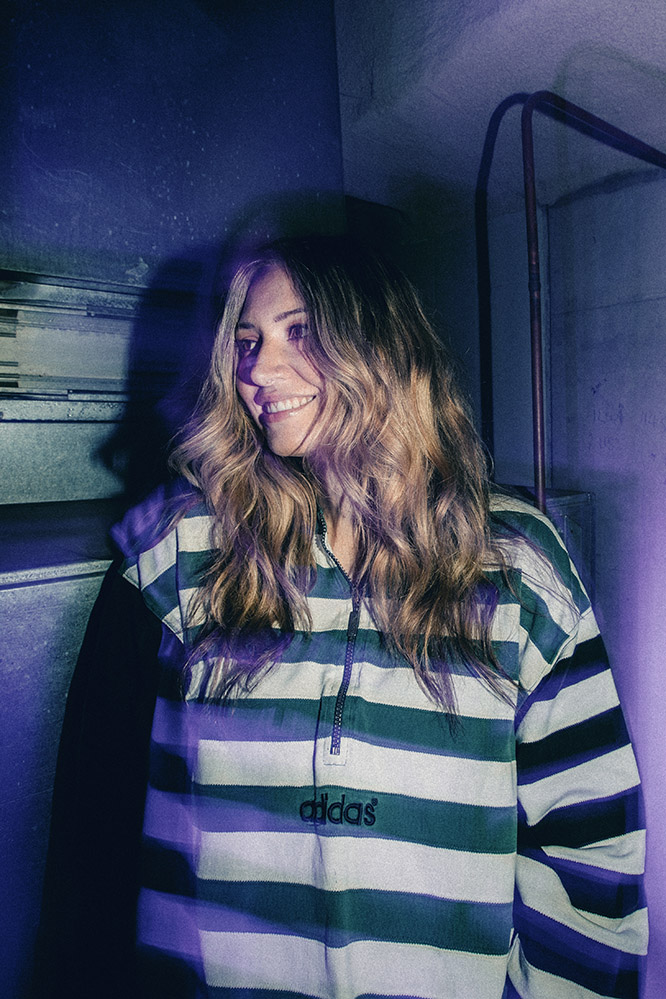Ryan Conduit*
Social media has become the new street corner soapbox for Christian activists – and their message is more potent than ever.
It’s April 2020, and as Australia grapples with stage three of the COVID-19 lockdown laws, twin fashion influencers Rebecca Loucas and Marissa Sohtra are passing the time indoors renovating their side-by-side houses in Melbourne’s east. It’s part of a six-month collaboration with Bunnings Warehouse, a campaign that will help keep the lights on – and brand new lights, at that – after they saw a significant reduction in work due to the pandemic.
“Technically our jobs have become irrelevant,” they tell me, lamenting the loss of their regular line-up of events and appearances. “We can’t leave the house.”
With social distancing laws firmly in place banning any ‘non-essential gatherings’, we resort to video chatting on Zoom about their isolated Easter celebrations, as one of their matching baby kittens lazily climbs the sofa behind them.
As Christians, Bec and Marissa tell me it “feels kind of sad” to be celebrating their first Easter without their congregation, instead having to settle for online church services and a solo, at-home viewing of The Passion of the Christ.
Ambassadors for Jesus
Sharing daily style inspiration to their 150,000 followers on Instagram under the moniker Twice Blessed, the Melbourne-based twin sisters (now both going by their married names) list themselves as ‘Ambassadors for Jesus Christ’ on their profile. Amongst the sleek, posed outfit posts and warmly filtered still life photos of various gifted products, are acknowledgements of the source of their good fortune; God.
“2020 is crazy so far, and may yet get crazier,” says the caption under a recent image of a pair of $1,800 Roger Vivier ankle boots shot in a Parisian apartment during Paris Fashion Week, “but we’re filled with peace because we know He is fighting our battles. For where there is instability and uncertainty, He is stable and always true.”
Love Music?
Get your daily dose of everything happening in Australian/New Zealand music and globally.
View this post on Instagram
It’s a potent theme for Twice Blessed – the combination of cool-girl style and the idea that the success they enjoy was a personal blessing, direct from God.
“God definitely gave us a mandate – that he’s allowing us to make Him cool,” says Sohtra. “For us Jesus is always cool, but I think for the population and the general consensus, people see church or God as not cool.”
“God definitely gave us a mandate – that he’s allowing us to make Him cool.”
“I remember God telling me specifically,” interjects Loucas, “your ministry is going to be in your work […] We’re living examples of who Christ is, but in our workplace. Doing it so organically, and in a way that is natural to us, makes Christianity look more realistic, more attainable. And more normal.”
Normal; it’s a word that Twice Blessed uses a lot in our interview, and something of a common motif that appears in all of my interviews with, and about, Christian influencers.
It’s tempting to baulk at the idea of two self-professed ‘Ambassadors of Jesus’ and 150,000-follower strong influencers who are gifted endless designer products as ‘normal’, but the thing is, it kind of is normal to them that their life revolves around capturing picture-perfect Parisian images of a pair of designer boots that cost more than my first car.
Not that it stops the trolls.
“I think they think that because you’re a Christian it means you have to live…” Loucas pauses, looking for the right word.
“Poor?” Sohtra offers.
“Yeah, in poverty, or restrict yourself,” Loucas continues. “We completely disagree. Like, in our business, we honour God. Our business is God’s, it’s not ours – we’ve given it to Him, and through that He’s blessed us with finance, through gifts and clothes. He’s not going to say you have to starve yourself of things that are nice and pretty because you love Me. We’re blessed because we have access to this […] it doesn’t give us value or give us worth, it’s just nice to have.”
Performing Normal
There’s a voyeuristic element to social media that fulfils our need to compare ourselves to others – but, perhaps more importantly, this act of comparison is a tool which fuels our desire to be ‘normal’.
We have an inbuilt compulsion to follow ‘normal strangers’ on the internet because it allows us to access what’s ‘normal’ for others – and compare our own ‘normal’ to theirs. Seeing comedian Celeste Barber parodying model poses is a performative acknowledgement of this desire: it’s a nod to us, the viewer, that yes, you are normal, like me. This is normal, that is not.
“Our business is God’s, it’s not ours – we’ve given it to Him, and through that He’s blessed us with finance, through gifts and clothes.”
“We all think there is something wrong with us because of how we think and how we act,” says Dr Hayley Watson, Clinical Psychologist and CEO of youth mental health organisation Open Parachute. “So when you normalise something, and you open up and you’re authentic, that’s what helps people connect to you. And that means they can listen to your messaging – and will get it on a deeper level.”
Our desire to feel normal is built into the human psyche. So normalising something is a powerful tool in the social media arsenal – and normalising Christianity by using typical Western iconography of fashion or modern motherhood is one of the primary aims for many of these influencers.

Hillsong influencer Laura Toggs. (Photograph by Yoseph Setiawan)
In Australia, strong religious beliefs are met with relative suspicion – and those beliefs aren’t as safe to express within general social circles as they were in the past. So normalising Christianity by placing it beside typical Instagram archetypes like the mum blogger, or the style blogger, goes some way to normalising it in the eyes of their potential converts.
“It’s not to lure people in, or manipulate,” says Loucas. “Biblically, we’re told to be in the world, but not of the world – and being in the world means being relevant.”
“People who are Christian wear skinny jeans, they wear designer clothes – just because you love Jesus, doesn’t mean you’re a square […] It’s dressed up with a cool concept and flashing lights, because that’s what people respond to. That’s what people our age gravitate to.”
The New Christian Influence
Religion: It’s a topic that generally makes Australians feel uncomfortable. According to an ABC survey from 2019, 60% of us would prefer that ‘people keep their religious views to themselves’, and ranked religious beliefs as the absolute least important factor in their sense of self and identity.
Yet, with our current Prime Minister so closely embedded within Sydney’s famous Hillsong Church – he was even accused of halting immediate action on Coronavirus-imposed social distancing until a Hillsong Colour Conference was done and dusted – it’s clear that a new wave of Christian influence is washing over our country, whether we like it or not. And speaking of Christian influence – Instagram is their new favourite platform.
“Social media has provided Hillsong’s youth ministry and team with an incredible opportunity to connect with young people directly,” says Jay Argaet, Hillsong’s Communications Director. “It is more important than ever to have an active social media presence to engage with people where they are.”
A call-out, hidden deep into the ‘resources’ section on the Hillsong website, appears to hint at an internal strategy to maximise the reach of their ministry. “In what areas might I be gifted and graced to be an influencer in?” the page, titled ‘Influence and Influencers’ asks. “As a Church where do we have influence? How can we tap into it to reach more people?”
When I enquired about the Hillsong social media strategy, and this page in particular, I was told the site wasn’t referring to social media influencers specifically.
“Hillsong views social media as a valuable tool for sharing a message of faith, hope, and love which is found in Jesus,” says Argaet. “Social media is merely another opportunity for us to point people to Jesus.”
“Social media has provided Hillsong’s youth ministry and team with an incredible opportunity to connect with young people directly.”
And what an opportunity. A recent study showed that 18-35 year olds are more likely to trust the opinions of bloggers and influencers than they are their own parents – but Watson says that’s less about generational change and more about the mode of delivery.
“Especially with young people, the power of the peer group is so huge,” says Watson, “especially at that age. They’re developmentally primed to look to their peers. And so this is what happens with a lot of things like religion or self-help or anything like that – it becomes really adult-centric, because it’s all adults that are talking about it.
“Teenagers don’t want to listen to adults, and that’s normal – because they’re in that phase of life. And so, when there’s no young people talking about something it can be really easy to have that barrier that gets put up. So I think there’s huge power in that storytelling approach [that influencers use] – in that sharing of, ‘This is my experience, this is what I went through’.”
Under the guise of wholesome family content and filtered selfies, you – along with many hundreds of thousands of others – may have been sucked into the shiny, Christian vortex of huge Hillsong influencers like Laura Toggs or Esther Houston.

Marissa Sohtra, one half of Twice Blessed. (Photograph by Ryan Conduit)
The former – daughter of Pastor Brian Houston (co-founder of Hillsong) – shares images of her fellow Hillsong pastor and husband Peter, their kids, and her music to her 153,000 followers. A prominent youth pastor within the Hillsong tribe herself, she founded Young & Free, a collective of musicians who are about to release their fourth album. She also runs The Secret Garden TV, a ‘judgement free’ website ‘inspiring girls to tend to what’s within before anything else.’
The latter – wife of Joel Houston (oldest son of Pastor Brian Houston and lead in Christian rock band Hillsong United) – prefers to share Chinese COVID conspiracies under the hashtag #ChinaLiedPeopleDied.
Houston, for this reason, is a particularly interesting Christian influencer, as most others I have spoken to prefer to avoid politics – despite how intertwined Christianity has become with Western right-wing ideals.
When I ask Twice Blessed about their thoughts on Esther Houston’s rampant anti-CCP postings, they shrug. “It’s ‘too hard basket’, it’s not for us,” says Sohtra. “If she wants to do that, that’s fine, but I feel like she’s opening herself up to an extra can of worms. The Christian thing already is a can of worms – it’s just another can of worms, like, don’t bother. It’s too hard.”
Controlling the Narrative
Arguably, for Houston, it may provide just the distraction she needs to avoid talking about uncomfortable Hillsong-related topics. And there are plenty; including allegations of child sex abuse, cutting artists out of their potential royalties, and even a secretly strong-armed invite to the White House from our own Prime Minister.
It’s bad press like that final story – where Australia’s top elected official allegedly sought to elevate a Christian leader into the storied halls of America’s seat of symbolic power – that does nothing to dispel an air of suspicion when it comes to out and proud Christians.
Australians perceive many religious people – and particularly Christians – as aggressive in their faith. But that’s a misleading generalisation, according to Twice Blessed.
“I think it’s because everyone has to have a [gestures quote marks] ‘cause’ in Australia,” says Loucas. “Either you’re a vegan, or you’re an activist – and I think that people assume because if they’re an activist for LGBTQ rights, or their food choice being vegan, they think that Christians are the same. They think we’re gung-ho, we’re bible bashers, because they’re the same, potentially, in their beliefs or their activism choices. And they’re like, well aren’t you the same way? Well, we’re not.”
“I think people have just forgotten what tolerance really means,” says Sohtra. “I’m not going to force it down someone’s throat.”
If anything, social media provides people like Toggs – attached, by her family, to a torrent of bad press – the possibility to craft a new narrative about being a Christian. Their own narrative.

Laura Toggs aims to craft a new narrative about being a Christian. (Photograph by River Bennett)
“I love the opportunity we have now to tell our own story as a church,” says Toggs. “We get to control our narrative and make sure that it’s the true story of everyday Australians, because at the end of the day that’s what our church is made up of; everyday Australians.
“And when the media are unkind to Hillsong, that’s what breaks our heart most – how this affects the people of our church […] My dad always says he can handle a bad report – he has big shoulders – but his heart breaks for the people of our church who go to work or school on Monday and may have to deal with fallout from such negative coverage.”
“When the media are unkind to Hillsong, that’s what breaks our heart most.”
The story of Toggs’ personal journey, navigating her way through a cruel and unforgiving media climate, is certainly tempting to sympathise with – particularly because much of the negative press she is attached to is through no fault of her own.
It’s a story she shares through a highlight on her Instagram page, titled ‘Q&A’ – answering questions about how she copes with living in the shadow of her family. “I just chose not to engage in any of it at all,” she says in one Instagram Story slide, replying to a fan question about people talking badly about her parents. “I hoped my life would speak louder than what others were saying.”
The Power of The Personal Story
As social media increasingly welcomes us into the lives of Christian influencers like Toggs, it shows us that, although they might hold different religious beliefs, they are ‘normal’ just like us.
“It’s the power of the personal story,” says Watson. “So when prejudice and bias and assumptions all come from taking what we hear at face value – what breaks through that is the individual story.
“There’s something about the [religious missionary] approach of knocking on a door that seems very much like, ‘You need to listen to me, this is what you should be doing’. The whole thing with social media is that it’s there for people to consume as they want to consume – so there’s the choice element. But then it’s always personal. It’s always about ‘me and my story’.
“People want to be able to make their own choice, and that’s really important […] Then people can find the truth or the learning that they want to take from it, without it being something they were told to do, or something that makes them ‘wrong’.”
It’s positive PR spin on a supremely subliminal level – that these bloggers, and their religion, by extension, cannot be bad. We know them, they’re like us.
And their story is certainly compelling. In the aforementioned 2019 survey, a whopping 71% of Australians acknowledged that religious people are subject to discrimination in this country due to their beliefs.
“As a young girl I found that there was a stigma attached to being a pastor’s kid,” says Toggs. “I remember almost being embarrassed to tell people that my parents were pastors or we were Christians.”
“But I was a young girl, and at the time the media were really cruel towards us, which was hard to navigate especially in high school. Now that I have grown up somewhat it’s different, and I believe the climate in Australia has changed. People seem more accepting.
“I just really wish people – especially in Australia – were just more open to hearing about God,” says Sohtra, “rather than straight away saying, ‘Nah, that’s bullshit, I don’t care.’”
Loucas nods, adding: “Rather than just being like, you believe in a dumb fairy in the sky.”
“I hope that will change in the future.”



































